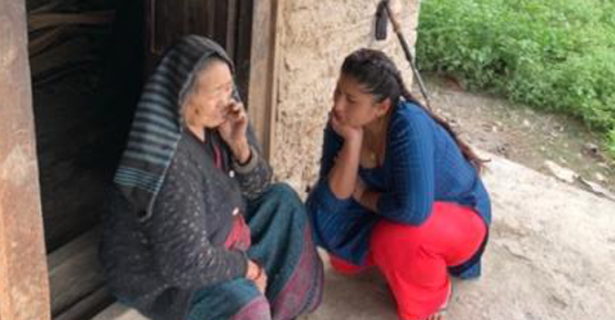One of the most special components of PHASE Nepal is their staff. Not only are PHASE staff highly trained and well equipped to treat their patients, they also display profound levels of compassion, kindness, and generosity. In a world where healthcare is corrupt and inaccessible for many, PHASE staff break down those barriers to ensure that anyone and everyone can receive care. In the small village of Manbu, the GROW team had the privilege of witnessing that first-hand.
The primary PHASE staff member in Manbu, Rashina, is a 27-year-old Nepali woman who was previously working in a hospital setting in the bustling capital of Kathmandu. She’s been in Manbu seven months and with PHASE for two and a half years, separated from her family in Phanauti and her husband stationed in Abu Dhabi. We inquired about how working in the village compares to her life in the city. Despite missing her family, she described her fondness for the community. In a village of roughly 3,000, we noticed Rashina never failed to say hello or strike up a conversation with another villager. Engaging with the community quite contrasts with stark hospital rooms, in which doctors do not have the opportunity to get to know their patients the same way.
When a stranger enters your community, you might expect resistance at first. However, what we witnessed was the opposite: the community embraced PHASE’s presence. In an hour and a half at the clinic, we saw seven patients and at an old age program dedicated to teaching about high blood pressure, 28 individuals above the age of 70 walked to the local school to listen to what Rashina had to say. When an expecting mother called at an inopportune time to announce the oncoming arrival of her child, Rashina dropped what she was doing and headed to the clinic.
During home visits, the villagers frequently offered her tea and when passing women on their hike back from the fields, Rashina was often given a generous portion of the day’s harvest. It was evident that the villagers not only needed Rashina, but they also valued her as an honorary member of their community.
Since PHASE has been in Manbu, the health of the community has improved. Rashina relayed to us that she has seen improvements in the nutritional status of women and children as well as better eating habits. PHASE and their staff were able to step in to evoke change where local government clinics could not.
The power of medicine is greater than the ability to accurately diagnose and treat a patient. Practicing medicine is also listening to, empathizing with, and caring for the sick and suffering. As a group of aspiring doctors, healthcare professionals, and global health researchers, our team learned and witnessed the importance of fostering a relationship between patient and provider while still performing medical responsibilities efficiently and effectively. PHASE staff truly exemplify these characteristics and provide hope for the future of global health.

